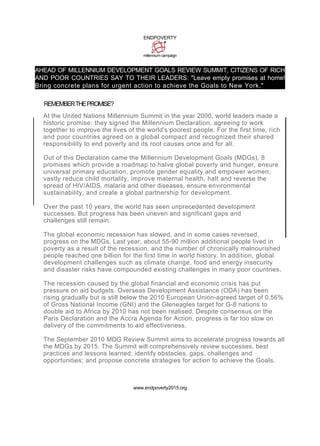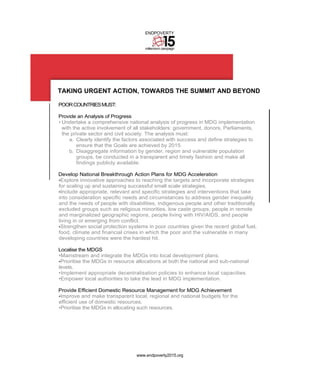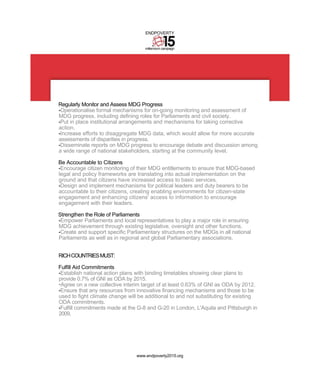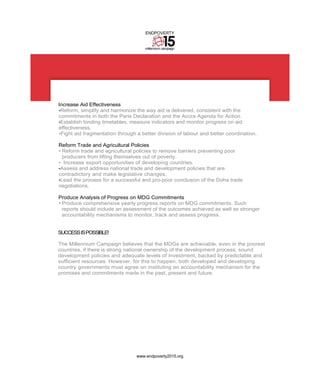Endpoverty
- 1. ENDPOVERTY millennium campaign AHEAD OF MILLENNIUM DEVELOPMENT GOALS REVIEW SUMMIT, CITIZENS OF RICH AND POOR COUNTRIES SAY TO THEIR LEADERS: "Leave empty promises at home! Bring concrete plans for urgent action to achieve the Goals to New York." REMEMBER THE PROMISE? At the United Nations Millennium Summit in the year 2000, world leaders made a historic promise: they signed the Millennium Declaration, agreeing to work together to improve the lives of the world's poorest people. For the first time, rich and poor countries agreed on a global compact and recognized their shared responsibility to end poverty and its root causes once and for all. Out of this Declaration came the Millennium Development Goals (MDGs), 8 promises which provide a roadmap to halve global poverty and hunger, ensure universal primary education, promote gender equality and empower women, vastly reduce child mortality, improve maternal health, halt and reverse the spread of HIV/AIDS, malaria and other diseases, ensure environmental sustainability, and create a global partnership for development. Over the past 10 years, the world has seen unprecedented development successes. But progress has been uneven and significant gaps and challenges still remain. The global economic recession has slowed, and in some cases reversed, progress on the MDGs. Last year, about 55-90 million additional people lived in poverty as a result of the recession, and the number of chronically malnourished people reached one billion for the first time in world history. In addition, global development challenges such as climate change, food and energy insecurity and disaster risks have compounded existing challenges in many poor countries. The recession caused by the global financial and economic crisis has put pressure on aid budgets. Overseas Development Assistance (ODA) has been rising gradually but is still below the 2010 European Union-agreed target of 0.56% of Gross National Income (GNI) and the Gleneagles target for G-8 nations to double aid to Africa by 2010 has not been realised. Despite consensus on the Paris Declaration and the Accra Agenda for Action, progress is far too slow on delivery of the commitments to aid effectiveness. The September 2010 MDG Review Summit aims to accelerate progress towards all the MDGs by 2015. The Summit will comprehensively review successes, best practices and lessons learned; identify obstacles, gaps, challenges and opportunities; and propose concrete strategies for action to achieve the Goals. www.endpoverty2015.org
- 2. ENDPOVERTY millennium campaign TAKING URGENT ACTION, TOWARDS THE SUMMIT AND BEYOND POOR COUNTRIES MUST: Provide an Analysis of Progress âĒ Undertake a comprehensive national analysis of progress in MDG implementation with the active involvement of all stakeholders: government, donors, Parliaments, the private sector and civil society. The analysis must: a. Clearly identify the factors associated with success and define strategies to ensure that the Goals are achieved by 2015. b. Disaggregate information by gender, region and vulnerable population groups, be conducted in a transparent and timely fashion and make all findings publicly available. Develop National Breakthrough Action Plans for MDG Acceleration âĒExplore innovative approaches to reaching the targets and incorporate strategies for scaling up and sustaining successful small scale strategies. âĒInclude appropriate, relevant and specific strategies and interventions that take into consideration specific needs and circumstances to address gender inequality and the needs of people with disabilities, indigenous people and other traditionally excluded groups such as religious minorities, low caste groups, people in remote and marginalized geographic regions, people living with HIV/AIDS, and people living in or emerging from conflict. âĒStrengthen social protection systems in poor countries given the recent global fuel, food, climate and financial crises in which the poor and the vulnerable in many developing countries were the hardest hit. Localise the MDGS âĒMainstream and integrate the MDGs into local development plans. âĒPrioritise the MDGs in resource allocations at both the national and sub-national levels. âĒImplement appropriate decentralisation policies to enhance local capacities. âĒEmpower local authorities to take the lead in MDG implementation. Provide Efficient Domestic Resource Management for MDG Achievement âĒImprove and make transparent local, regional and national budgets for the efficient use of domestic resources. âĒPrioritise the MDGs in allocating such resources. www.endpoverty2015.org
- 3. ENDPOVERTY millennium campaign Regularly Monitor and Assess MDG Progress âĒOperationalise formal mechanisms for on-going monitoring and assessment of MDG progress, including defining roles for Parliaments and civil society. âĒPut in place institutional arrangements and mechanisms for taking corrective action. âĒIncrease efforts to disaggregate MDG data, which would allow for more accurate assessments of disparities in progress. âĒDisseminate reports on MDG progress to encourage debate and discussion among a wide range of national stakeholders, starting at the community level. Be Accountable to Citizens âĒEncourage citizen monitoring of their MDG entitlements to ensure that MDG-based legal and policy frameworks are translating into actual implementation on the ground and that citizens have increased access to basic services. âĒDesign and implement mechanisms for political leaders and duty bearers to be accountable to their citizens, creating enabling environments for citizen-state engagement and enhancing citizens' access to information to encourage engagement with their leaders. Strengthen the Role of Parliaments âĒEmpower Parliaments and local representatives to play a major role in ensuring MDG achievement through existing legislative, oversight and other functions. âĒCreate and support specific Parliamentary structures on the MDGs in all national Parliaments as well as in regional and global Parliamentary associations. RICH COUNTRIES MUST: Fulfill Aid Commitments âĒEstablish national action plans with binding timetables showing clear plans to provide 0.7% of GNI as ODA by 2015. âĒAgree on a new collective interim target of at least 0.63% of GNI as ODA by 2012. âĒEnsure that any resources from innovative financing mechanisms and those to be used to fight climate change will be additional to and not substituting for existing ODA commitments. âĒFulfill commitments made at the G-8 and G-20 in London, L'Aquila and Pittsburgh in 2009. www.endpoverty2015.org
- 4. ENDPOVERTY millennium campaign Increase Aid Effectiveness âĒReform, simplify and harmonize the way aid is delivered, consistent with the commitments in both the Paris Declaration and the Accra Agenda for Action. âĒEstablish binding timetables, measure indicators and monitor progress on aid effectiveness. âĒFight aid fragmentation through a better division of labour and better coordination. Reform Trade and Agricultural Policies âĒ Reform trade and agricultural policies to remove barriers preventing poor producers from lifting themselves out of poverty. âĒ Increase export opportunities of developing countries. âĒAssess and address national trade and development policies that are contradictory and make legislative changes. âĒLead the process for a successful and pro-poor conclusion of the Doha trade negotiations. Produce Analysis of Progress on MDG Commitments âĒ Produce comprehensive yearly progress reports on MDG commitments. Such reports should include an assessment of the outcomes achieved as well as stronger accountability mechanisms to monitor, track and assess progress. SUCCESS IS POSSIBLE! The Millennium Campaign believes that the MDGs are achievable, even in the poorest countries, if there is strong national ownership of the development process, sound development policies and adequate levels of investment, backed by predictable and sufficient resources. However, for this to happen, both developed and developing country governments must agree on instituting an accountability mechanism for the promises and commitments made in the past, present and future. www.endpoverty2015.org




